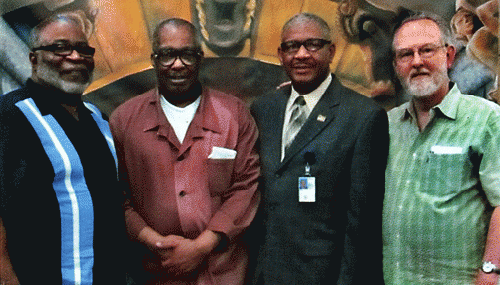- Apocalypse Now
Over the past ten years, I've developed a friendship with Commer Glass, a 67-year-old African American man serving his 37th year of a life-without-parole sentence at Graterford State Prison outside Philadelphia. Glass fought as a 20-year-old combat infantryman in the thick woods west of Pleiku in the famous 1965 battle of the Ia Drang Valley. It was in the Ia Drang that US troops first went mano a mano with the North Vietnamese Army.
An NVA commander described the battle from the Vietnamese point of view this way: The order went down to the North Vietnamese soldiers to get close enough to the Americans to "grab them by their belt buckles."
It was a horrific battle by anyone's standards. There was a Mel Gibson movie made from a book about the battle titled We Were Soldiers Once ... And Young by retired General Harold Moore and journalist Joseph Galloway.
To me, Glass is a casualty of that battle and of that unfortunate, tragic war just as certain as night follows day and rain makes things wet.
CAPTION: Left to right, Vietnam combat vet & Reverend Dwight Edwards, Commer Glass, Director of the VA Regional Re-entry Program Otis Nash and the author
The story is complicated by a number of things. One, Glass is a black man in prison for first degree murder involving the killing of a woman, and in Pennsylvania, especially in the cover-one's-ass political climate of Harrisburg, the capital of Pennsylvania, he is a hot potato. There are not very many profiles in courage in Pennsylvania when it comes to someone like Glass. It's much easier -- and safer -- to just let him rot in Graterford.
I'm involved with a grassroots group working with the Pennsylvania Prison Society seeking the release of Glass and other Vietnam veterans like Glass who are serving life-without-parole sentences in Pennsylvania, one of the rare states in the union that has absolutely no parole for lifers. You die in lock-up unless your sentence is commuted by the governor.
Former Pennsylvania Governor Ed Rendell could have commuted Glass' sentence as he left office in January 2011, but he declined to do so. He did commute several others. Rendell worked as a Philadelphia district attorney in the 1970s and began his political career by running for District Attorney in Philadelphia two years after Glass was convicted under DA Emmett Fitzpatrick. Rendell ran on an anti-corruption platform and called for getting tougher on murder cases by pursuing death sentences and, of course, life-without-parole.
Rendell is now a paid TV commentator on politics and NFL football; he works with his old law firm, is a senior adviser with the Greenhill investment bank and an operating partner with Element Partners, a Philly investment group. He also just published a book called A Nation of Wusses: How America's Leaders Lost the Guts to Make Us Great.
I'm not a politician, so I certainly don't understand the subtleties of
power like Ed Rendell does. But over the years I photographed Rendell
several times and actually had two short conversations with him. He is
eminently likable and a rough-and-tumble kind of guy. But I also know
about the Vietnam War from reading a lot and serving as a
radio-direction finder in the same area west of Pleiku where Glass
served earlier than me. Living for years in Germantown in Philadelphia, I
also have some sensitivity as to what it means for a black man like
Commer Glass to be a hot potato in Harrisburg politics.
Given all that, I think it's fair to say Governor Rendell is a first-class political wuss when it comes to assuming risk to see justice done. His wussdom in this case becomes clearer when you consider the Glass case involves race in the Philadelphia criminal justice system at a time he was a district attorney in that system. Adding more heat to that already hot potato is the fact the case involves the image of the Vietnam War in the popular American mind.
In Pennsylvania, interestingly, we had a previous governor -- Tom Ridge -- who was a Vietnam combat veteran. Ridge ran on a pro-death penalty platform and once literally said, since he had killed people in Vietnam, he would be able to sign death warrants.
The reason the Glass case is so interesting to me, of course, is because it is such a hot potato that focuses the mind on issues of killing and murder, especially who can kill and who can't? What kind of killing is acceptable and what kind is not? And, finally, once one sinks into this moral gray zone, who gets the mitigating breaks and who receives the aggravating demonization?
All testimony concerning Glass as a youth in North Carolina suggests he was a decent, friendly, law-abiding kid who just wanted to fit in and belong. He followed his older brother into the Army and was thrown into the life-or-death brutality of the Ia Drang and Vietnam. Motivated by fear in a firefight, he saw movement in some bushes and inadvertently killed a woman and child with an M79 grenade launcher. Outside of Pleiku, he killed a prostitute who he claims was planning to kill him and his friend. Personally, I know the general area of laundries and peasant houses this occurred in. When I was in Pleiku two years later it was off-limits and reputed to be sympathetic to the Viet Cong.
Glass says he does not remember stabbing Billie Ann Morris the night of October 12, 1975, in the Germantown area of Philadelphia. No one argues that he was not an unholy mess at that juncture in his life. That night, as he was roaming the streets cranked up on methamphetamines, he ran into Morris, whom he had been involved with on and off. After the stabbing in a parking lot, he recalls picking her up and driving her to the Germantown Hospital Emergency Room, where she died. While Glass may not remember the stabbing for a number of possible psychological reasons, he unambiguously concedes he did it.
(Note: You can view every article as one long page if you sign up as an Advocate Member, or higher).





